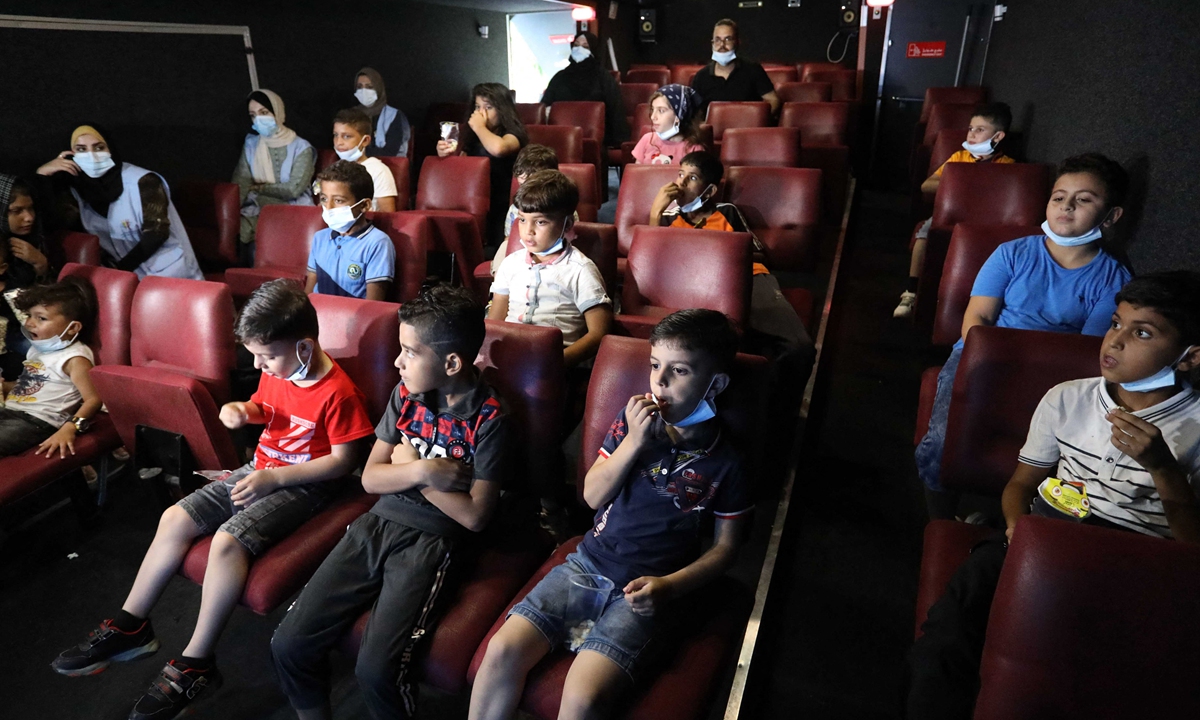ARTS / FILM
Mobile cinema allows residents to watch movies on big screen in Gaza
On the move

Palestinian children watch a movie in a mobile movie theater in Gaza City, Gaza on August 19. Photo: AFP
For the first time in his life, Aaid al-Qatanani, a young Palestinian man from the Gaza Strip, entered a cinema hall to watch a foreign movie.The 22-year-old computer engineer was among other 40 young people who sat at red benches in a small hall of a cinema and ate popcorn while they were watching the movie.
"It was an amazing feeling to enter the cinema. I dreamed many times to watch my favorite movie there rather than on TV or websites," al-Qatanani told the Xinhua News Agency.
The cinema, different from what people usually see in other countries, is a mobile one, manufactured from a huge passenger bus.
The bus can accommodate about 50 passengers and includes a wheelchair ramp to assist the disabled. It also has an integrated security system with emergency doors, alarms, firefighting equipment, air conditioning, and ventilation and uses solar energy to run the projectors.
"Through most of my life, I used to see my father, uncles, and people around me struggle to obtain the basic needs for their families. I don't remember a time when my parents took me to the cinema to watch movies," Qatanani recalled, saying that all they cared about was to keep the family afloat.
Elham Jasir, a young woman from the Jabaliya refugee camp in the northern Gaza Strip, said she felt like she was in another place out of Gaza when she entered the cinema.
"For a moment, I felt as if I was traveling to another country that has big cinemas," the 25-year-old said as she flashed a smile.
"We need such cinemas in Gaza, especially as they would revive our cultural life that disappeared among the Gaza crises," she said.
Both Qatanani and Jasir expressed their hope to live an ordinary life in Gaza and have the means of entertainment and believed that this would help the people get rid of their negative energy and internal pressure.
Israel imposed a blockade on the Gaza Strip in 2007, right after the Islamic Resistance Movement (Hamas) had seized control of the coastal enclave.
The Israeli blockade, the internal Palestinian divisions between Gaza and the West Bank, in addition to the four Israeli wars waged over the past 13 years, had left the territory with high poverty and unemployment rates.
According to figures from Gaza-based rights groups, 55 percent of the people in the Gaza Strip, a home for 2 million Palestinians, suffer from depression, while 50 percent of the children in the coastal enclave are in need of psychological support.
"In the 1990s, the situation was not like this," Amina Abed, a 56-year-old woman from Gaza, told Xinhua, saying "we were able to go to cinemas in Gaza and enjoy our times as well as live in peace and security."
The woman recalled that she and her friends used to visit cinemas to watch dozens of Arab and foreign films without any sort of social restriction.
The first cinema in Gaza was built in 1944 and by the late 1960s, there were 10 others.
However, disputes among political forces and Islamic parties caused the closure of cinemas during the first Palestinian intifada in 1987 and they have remained closed due to government and political restrictions.
A nongovernment organization, Save Youth Future Society, launched the mobile cinema project to allow Gazans to enjoy their time, according to Engi Abu Obaidullah, the project coordinator.
"We aim to revive art and culture in Gaza and promote positive concepts within Palestinian society and enhance the presence of all aspects of culture," she said.
Obaidullah said he hopes the mobile cinema can be the first step for the reopening of normal cinemas in the coastal enclave, bringing more cultural activities back to the people who have suffered long enough in conflict and blockade.



